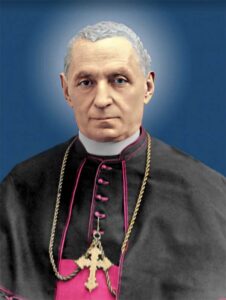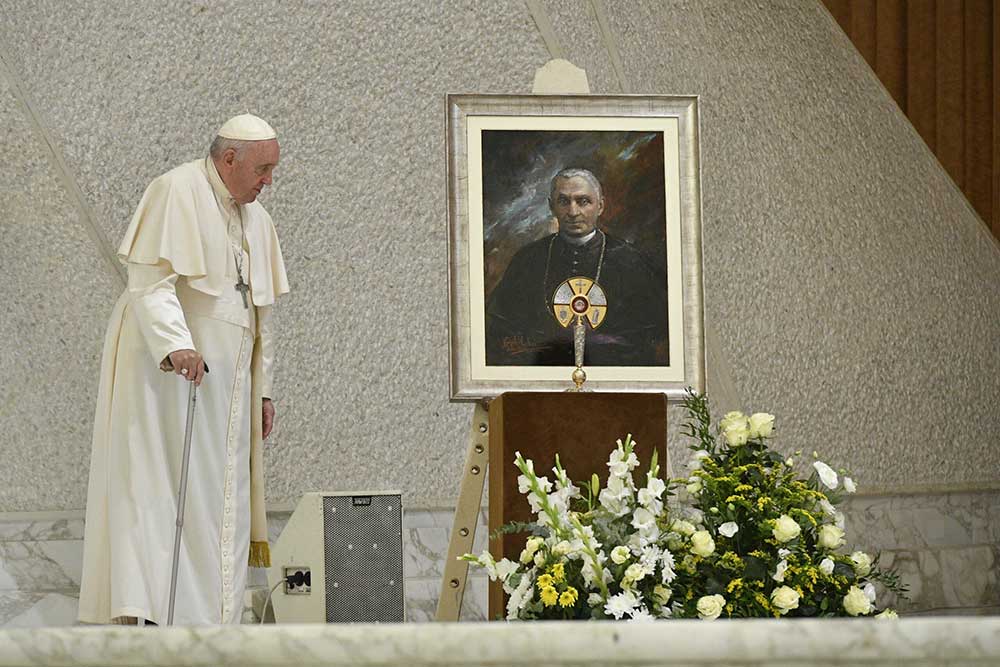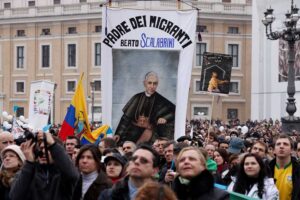John Baptist Scalabrini, a New Saint for the Church
 Since the year 1979 the Scalabrinian Missionaries have embraced the mission of assisting and caring for the elderly at Villa Scalabrini in Sun Valley, CA. They have been inspired by the deep spirituality and example of their founder Saint John Baptist Scalabrini who cared for those in need, particularly the migrants.
Since the year 1979 the Scalabrinian Missionaries have embraced the mission of assisting and caring for the elderly at Villa Scalabrini in Sun Valley, CA. They have been inspired by the deep spirituality and example of their founder Saint John Baptist Scalabrini who cared for those in need, particularly the migrants.
The Priest
Born in 1839 in Fino Mornasco, Province of Como, Italy, very early in life Scalabrini heard the call of God to dedicate himself to priestly ministry in the Church. He was ordained a diocesan priest at the age of twenty-four but felt a strong desire to be a missionary. In fact, as a young priest he signed up with the Institute of Foreign Mission in Milan. His bishop decided instead to assign him to the task of priestly formation as teacher and vice rector and later rector of the diocesan minor seminary.
At the age of thirty-one, Scalabrini was named pastor of St. Bartholomew, a parish in the industrial suburb of Como with a population of 6,000. It is here that he began to display his exceptional pastoral gifts, especially in the areas of instruction in the faith and works of charity. Catechetics always ranked high among his pastoral priorities, so much so that he even wrote a small catechism for kindergarten children. His love for the sick and his frequent visits to them were well known among his flock. St. Bartholomew parish was quickly becoming the focal point of Catholic social action in the diocese. In 1872 on the study of the First Vatican Council, Scalabrini was invited by his bishop to give eleven conferences in the Cathedral of Como.
The Bishop
At the early age of thirty-six, Scalabrini was named bishop of Piacenza. There he remained for twenty-nine years until his death in 1905. His accomplishments as a diocesan bishop are truly amazing. As shepherd of his flock, Bishop Scalabrini chose as his role model another great bishop in the Church who lived in the sixteenth century, St. Charles Borromeo. In fact, if we examine the lives of these two bishops, we see some interesting parallels. Both were very practical people with deep commitments to social action; both were committed to the pursuit of holiness through prayer, penance, self-denial and an intense zeal for their flocks; both were devoted to the Crucified Lord, the Holy Eucharist, and the Blessed Virgin Mary; both had genuine concerns not only for their local churches but the Universal Church as well; both were genuinely concerned about the formation and spiritual life of the clergy.
Like the Good Shepherd Jesus Christ, Bishop Scalabrini wanted to know his people. During his 29 years of episcopal endeavor, he visited not once but five times all 365 parishes in the diocese, 200 of which were in mountainous areas accessible only by mule and some only on foot.
In 1889, he organized in Piacenza the first national catechetical congress in the history of the Church. He published the first Italian catechetical review, only the second of its kind in the world. No wonder then that Pope Pius IX would call Bishop Scalabrini “The Apostle of the Catechism.”
Bishop Scalabrini will also be remembered for his extraordinary efforts on behalf of the poor. His innate love for the needy was limitless. He never turned away those who every day knocked on his door for help. He aided the sick, the orphans and prisoners. During the period of drought in 1879-1880, he set up a soup kitchen that in two months alone distributed almost 250,000 bowls of soup as well as bags of flour and cords of wood. When the funds were depleted, Bishop Scalabrini sold his horse, which was donated to him for his pastoral visitations, as well as the chalice given him as a gift by Pope Pius IX.
Two other major social projects deserve mention. In 1879 he founded an institute for the hearing and speech impaired and in 1903 an agency to provide religious and social assistance to the more than 170,000 rice pickers in Piedmont and Lombardy, an organization designed to prevent the abuse of women and children in the workplace.

The Prophet
The social dimension of Bishop Scalabrini’s pastoral activities is perhaps best seen in his founding three religious institutes: the Missionaries of St. Charles (1887); the St. Raphael Society (1889); and the Missionary Sisters of St. Charles (1895). In these three extraordinary accomplishments, we see the prophetic side of Bishop Scalabrini.
The heart of the pastor would not allow him to remain oblivious to the fact that in 110 years over 25 million Italians emigrated, in large part to North and South America. He saw 11% of his own people of Piacenza leave Italy for foreign countries.
Bishop Scalabrini took immediate action. He travelled up and down Italy trying to sensitize public opinion to the seriousness of the phenomenon of migration. He was instrumental in the formulation of Italy’s policies and legislation concerning emigration. He recruited lay men and women volunteers for the St. Raphael Society to help at the ports of departure and entry. This Society opened secretariats in Genoa and New York as well as nineteen committees in Italy.
The Scalabrinian Congregation of priests and brothers now totals more than 700 members while the Congregation of Sisters numbers more than 1,000. These spiritual sons and daughters of Bishop Scalabrini, scattered in all corners of the globe, dedicate their lives to the pastoral and social work of evangelization on behalf of migrants, refugees, and people on the move.
The Inner Man
Bishop Scalabrini intense life of faith and love for God led him to grow in his love for God’s people. He had a filial devotion to the Blessed Virgin Mary, reciting every day the rosary which for him was the epitome of all Marian devotions. He also had a devotion to the saints, St. Joseph, St. Charles Borromeo, St. Francis de Sales, and the patron saints of the Diocese of Piacenza.
Bishop Scalabrini was remarkable for his devotion to the Holy Eucharist. He celebrated Mass each day with extreme devotion and often would assist at a second Mass. He spent long hours in prayer before the Blessed Sacrament. He said that the Eucharist is the treasure and deposit entrusted to priests. Bishop Scalabrini had also a great devotion to the Crucified Lord. In these two devotions we see how his spirituality is incarnational. As he put it: The Eucharist and Golgotha are a single extension of the Incarnation.
Bishop Scalabrini’s spirituality was also ecclesial. He believed, trusted, and loved the Church. He was a true churchman in the sense of the Fathers of the Church. His motto was: sentire cum ecclesia. He respected the rich tradition of the Church’s past, studied its history, explored, and revered the Church’s tradition but never sought to hide in the past nor condemn the Church of the present. Bishop Scalabrini’s love for Christ, the invisible head of the Church, was parallel by his love for the Pope, the visible head of the Church. His obedience to the Holy Father was a constant in his life and constitutes one of the elements of his heroic virtues.

Advocacy and Evangelization of All Migrants
Bishop Scalabrini saw no dichotomy or contradiction between being a man of God and a man of social action. In fact, he viewed these two as complementary. His apostolic preferential option for the poor was seen in his pastoral concern for the migrants who were leaving his diocese for economic reasons, bound for North and South America. He saw the need for a specialized pastoral care for these poor people struggling to keep their faith in new surroundings. This is what led him to found two religious communities dedicated specifically to this purpose.
Bishop Scalabrini viewed migration and the movement of peoples not as a social phenomenon which would eventually disappear but rather as something which the world and the Church would have to deal with for ages to come. He saw migration as part of a changing society. Scalabrini wanted his religious congregation to be of pontifical rite with religious vows. This would ensure stability in the pastoral care of migrants. To support his effort worldwide, he petitioned the Holy See to establish an office in Rome to coordinate the pastoral activity of migration around the world. This took place after his death when in 1912 St. Pius X instituted an emigration office in Rome under the authority of the Consistorial Congregation. In 1970 Pope Paul VI changed it to a pontifical commission for the spiritual care of migrants still under the dependence of the then Consistorial Congregation (now the Congregation of Bishops). Finally in 1988, the Holy Father, Pope John Paul II created the Pontifical Council for the Pastoral Care of Migrants and Itinerant People. Bishop Scalabrini dream was thus fulfilled.
As part of the ministry to migrants, Scalabrini recognized the importance of social advocacy on their behalf. He defended the right of people to emigrate when this was done in a way consistent with human dignity. He was quick to denounce social injustices and the exploitation of migrants as well as unjust political structures which caused the need to emigrate. He opposed the enforced assimilation of migrants and defended the social model of multiculturalism long before this term became fashionable. He rightly deserves the title “Father of the Migrants” and to have his name inscribed in the wall of honor in Ellis Island, New York, the port of entry where, by the time of the death of Bishop Scalabrini in 1905, 1,771,000 Italians had arrived.
Bishop Scalabrini founded his congregations because of his profound concern for the emerging reality of human mobility. His target was the thousands of Italian emigrants leaving their country every day for lands beyond the sea. He recruited Italian priests and Italian-speaking laity to assist them with their religious and social needs in their land of adoption. He considered identity of language, culture, and traditions in building the bridge between the old and new world.
When the Second Vatican Council in its decree Perfectae Charitatis (1965) called for the renewal of religious life, the Scalabrinian Congregation took this call seriously by returning to the original inspiration of the Founder and viewing it in the light of the changed conditions of the times. The Founder’s first and immediate concern for the Italian migrants now became a pastoral concern for all migrants. The new and approved Rules of Life of the Congregation establishes this universal perspective: “We fulfil our mission, first and foremost, among those who, for any reason, are living outside their native land or ethnic community and, out of real necessity, require a specific pastoral care; likewise among those who, because of internal migration, live in analogous situations because of ethnic, social and cultural differences; finally among seamen, the refugees and the displaced people” (n. 23).
The Vision Continues
It is becoming obvious to all that migration is a worldwide phenomenon of extraordinary proportions. United Nations statistics alert us to the fact that the number of persons living in a country other than that of their birth is escalating. There were 75 million in 1965; 85 million in 1975; 106 million in1985; 125 million in 1995; almost 280.6 million in 2020. This amounts to more than 4 per cent of the global population of 7.8 billion. Human mobility, for whatever the reason, seems to have become a structural dimension of modern society. No one country seems to be alien to some form of migration.
John Baptist Scalabrini remains more than just a page in history. His vision and understanding transcends his era. He may stand apart from us by a century of time, but he reaches far beyond his own period of time. He understood migration as an interpretative key to comprehend the transformations of history and God’s plan of salvation. His spirituality and pastoral seal speak to the world of today and stands as a contemporary positive role model for all the migrants, the missionary church, and civil leaders.
On November 9, 1997, Pope John Paul II formally declared Bishop Scalabrini Blessed. In his homily he said: The universal call to holiness was constantly felt and personally lived by John Baptist Scalabrini. He loved to say over and over: “Would that I could sanctify myself and all the souls entrusted to me!”. Striving for holiness and proposing it to everyone he met was always his first concern. Deeply in love for the poor, particularly for emigrants, he became the apostle of his compatriots compelled to leave their country, often under difficult conditions and in concrete danger of losing their faith: for them he was a father and sure guide.
On October 9, 2022, Pope Francis proclaimed John Baptist Scalabrini Saint as Founder, Apostle of the Catechism, Father of the Migrants, Refuges and Seafarers.
Let us rejoice and praise God for having a new Saint in the Church. May his intercession increase worldwide attention to the care of vulnerable people, particularly those on the move.
Saint John Baptist Scalabrini, Pray for us!!
Fr. Adilso Luiz Balen, C.S
Executive Director

